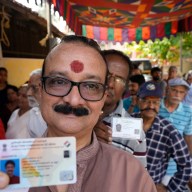OTTAWA – A training mission described as “relatively safe” by the Conservative government and the military saw its first casualty Saturday with the death of a Canadian soldier in a Taliban suicide car bombing along a busy thoroughfare in Kabul.
Master Cpl. Byron Greff of the 3rd Battalion Princess Patricia’s Canadian Light Infantry was killed in the explosion around 11:30 a.m. local time.
Gref, who was based in Edmonton, served as an advisor and instructor to Afghan army trainers working with Afghan soldiers.
His death is the first since Canadian combat operations in Kandahar ended earlier this year and the new Afghan army training mission involving 920 soldiers began.
With Saturday’s death, 158 Canadian soldiers have died in connection with the Canadian military’s operations in Afghanistan.
Greff was taking a routine trip between between training and headquarters bases in the Afghan capital when a car packed with explosives rammed into a heavily armoured NATO bus known as a Rhino. It was escorted by two heavily armed patrol vehicles at the time.
A total of five NATO soldiers and eight civilian contractors were killed in the blast. Four Afghans died and scores of others were wounded.
According to reports from the scene, the explosion happened as the convoy passed the American University in Kabul. The blast sparked a fireball that littered the street with shrapnel and heavy black smoke.
When it announced almost a year ago that Canada would undertake a training mission until 2014, the Harper government insisted that troops would be safe because instruction would take place behind the wire of fortified bases.
But Kabul has become an increasing focus for spectacular Taliban attacks, including a 20 hour shoot-out near NATO’s main headquarters and the U.S. embassy last month a gunfight that involved Canadian troops who’d just arrived at Camp Eggers in a convoy.
“Afghanistan is a dangerous place,” said Lt.-Col. Christian LeMay, a spokesman for Canada’s Ottawa-based overseas headquarters. “Precautions have to be taken and in this case precautions were taken. It was a bad attack.”
Walter Dorn, an expert in peacekeeping and the Afghan conflict at the Royal Military College of Canada, said no mission, even for training, is without danger.
“The Canadian government calls it a non-combat mission, but there are cases where you might find your soldiers actually engaged in combat, if only for self-protection,” he said.
Insurgents clearly intend to target the Afghan army trainees and their foreign instructors both in the field and in their camps, he said.
Both NDP Leader Nycole Turmel and Liberal leader Bob Rae expressed their condolences to the family of the dead soldier.
The death shows the continuing dangers in Afghanistan, Rae said, but “the training mission is probably the least risky of any potential presence in Afghanistan.”
The Taliban claimed responsibility for the Kabul attack, as well as for another suicide bombing outside a government intelligence office in the northwest province of Kunar.
It was the deadliest single attack against the U.S.-led coalition since the Taliban shot down a NATO helicopter on Aug. 6 in an eastern Afghan province, killing 30 U.S. troops, most of them elite Navy SEALs, and eight Afghans.
The commander of all Canadian troops overseas, Lt.-Gen. Stuart Beare, says insurgents have been focusing on headline-grabbing attacks that are meant to undermine confidence in the Afghan government.
“They are going to be trying to do this all of time,” Beare said an interview with The Canadian Press, conducted before Saturday’s deadly bombing. “They’re not after territorial gain. They’re going to continue to attack in the perception space and the idea that Afghanistan will never be safe.”
Referring to the assault last month, Beare said Canadian troops have full authority to open fire in self-defence no matter the circumstances.
“They will protect their partners,” he said. “We are not prohibited from protecting others and why would we be? If we are moving between location A and location B and we are fired upon, we will definitely protect ourselves and our partners.”
The Kabul attack occurred near the landmark Darulaman Palace, the bombed-out seat of former Afghan kings.
Canadians, along with soldiers from several other countries, are training Afghan army trainers at a base near the palace.
Buses, which shuttle thousands of troops around the embattled capital have long been tempting targets going right back to the beginning of the war.
Four German soldiers were killed and 31 injured when a suicide bomber in a taxi rammed their unarmoured bus in June 2003. The troops had been scheduled to leave Kabul on that day after a six-month deployment.
A year later, Cpl. Jamie Murphy, of the 1st Battalion Royal Canadian Regiment, was killed when a bomber threw himself on the hood of a jeep near the site of Saturday’s bombing.
And in April 2010, Col. Geoff Parker, the highest ranking Canadian to die in Afghanistan, was killed along with five Americans by a suicide bomber in Kabul.
















